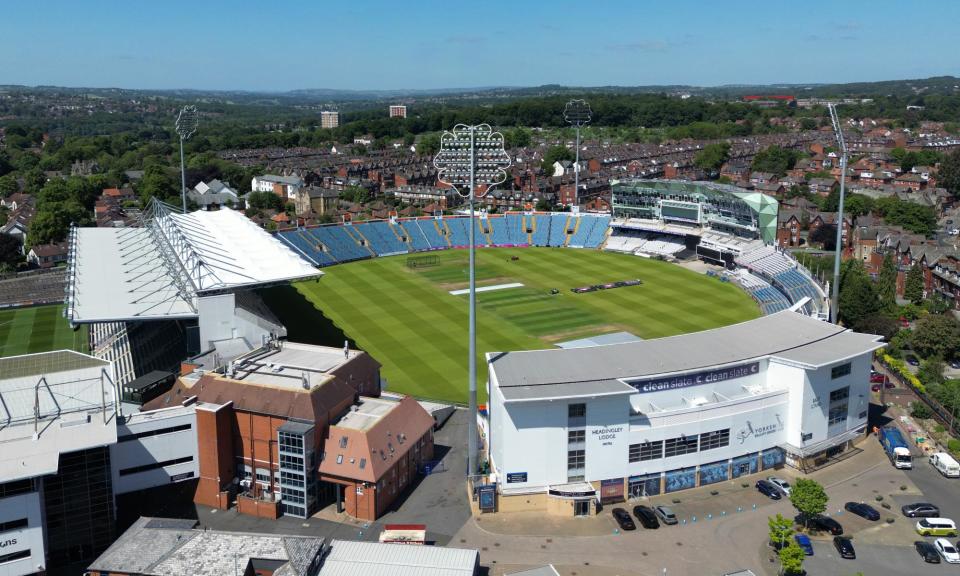Graves calls for unity after 88% vote in favour of Yorkshire takeover

Colin Graves said he hoped “a line has been drawn in the sand” after his controversial return to Yorkshire was overwhelmingly approved at an extraordinary general meeting at Headingley on Friday. “Where we are, what happened in the past, let’s move forward,” he said. “Let’s look forward instead of looking back.”
The resolutions needed for Graves to resume control passed by 746 to 99, an 88.3% majority – though less than a quarter of the club’s 3,500 members cast a vote – and the former chairman will return to the board once the Financial Conduct Authority green-lights the move, which is expected within the next fortnight.
Related: Tired and divided: how Yorkshire fans view likely return of Colin Graves
During the meeting Steven Vaughan, Yorkshire’s chief executive officer, described suggestions – made most prominently by the independent peer Baron Mann – that possible alternative bidders had been ignored as “absolute lies”. He said the club had “done a global search using brokers based on every continent, we’ve kissed a lot of frogs and we’re at a place now where Colin’s deal is the only one that will keep the business solvent going forward”.
During the process of scouring the world for potential saviours several interested parties, including the owners of multiple Indian Premier League franchises, pulled out of talks because of the club’s status as a cooperative society. The former Newcastle chairman Mike Ashley came within hours of finalising a deal, for which all legal documents had been completed and even communications strategies prepared, before he decided to walk away at the 11th hour.
That left Graves, who having had an initial offer rejected on the basis that he too demanded demutualisation, a process which has to be agreed by the membership in two votes, returned with a second bid that made no mention of the club’s future status.
After the vote Graves told the Guardian that he had no intention of forcing through a change in status, though doing so would enable him to resurrect potentially lucrative takeover talks with IPL clubs. “I’m not doing this for the good of Colin Graves, I can assure you,” he said. “I’m doing this for the good of Yorkshire. I could be sat at home with my slippers on my feet doing nothing. I’ve made the decision to come here and get the club back to where it needs to be.”
Graves had previously acted as Yorkshire’s chief executive between 2002 and 2006 and then as chairman until 2015, when he took a similar role at the England and Wales Cricket Board. The club has since admitted that racism and discrimination was a significant issue during much of his 13 previous years at Headingley, which Graves had denied, dismissing instances of abuse within the dressing-room as “banter”. After his takeover was ratified by the board last month he said he “profoundly regrets” using that language.
“I will give my personal pledge that regardless of background, community, ethnicity, everybody will be welcome in a fully inclusive culture and environment at Yorkshire,” Graves, who sat on the front row while his return was debated, told members after the vote. “There will be no exceptions. I have already unreservedly apologised for any and all mistakes that were made by the club or I over those painful, difficult years in the past. Lessons have been learned and will be acted on. We all need to move forward together in ensuring Yorkshire’s sustainability both on and off the pitch. Today I hope is a line being drawn in the sand.”
In the club’s most recent accounts their debts stood at £14.9m and they needed an immediate injection of £500,000 to finance their longstanding loan from the Graves Family Trust. In 2016 Durham were saved from administration by emergency funding from the ECB, which led to them being relegated, having a further points deduction, and being stripped of their Test status.
The ECB confirmed on Friday that they had not discussed a similar rescue package with Yorkshire, and Harry Chathli, the club’s outgoing chairman, said the idea of requesting one had been rejected because of the importance of Test cricket to the club’s business model – so central that had they been allocated a Test this summer “absolutely” none of this would have happened.
“We would have had the money,” Chathli said. “But I don’t want anyone to get the impression that the ECB did anything wrong, they just do this by rota. It just so happened that, with all the other things happening, it was a perfect storm.

